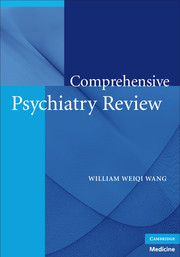Book contents
- Frontmatter
- Contents
- Introduction
- PART I INTELLECTUAL FOUNDATION OF PSYCHIATRY
- PART II EVALUATION AND MEASUREMENT
- PART III PSYCHIATRIC DISORDERS
- PART IV PSYCHIATRIC THERAPEUTICS
- PART V NEUROPSYCHIATRY AND RELEVANT NEUROLOGIC CONDITIONS
- PART VI SPECIAL TOPICS
- PART VII REVIEW QUESTIONS
- Questions (1–150)
- Answers (1–150)
- Bibliography
- Index
Questions (1–150)
from PART VII - REVIEW QUESTIONS
Published online by Cambridge University Press: 18 January 2010
- Frontmatter
- Contents
- Introduction
- PART I INTELLECTUAL FOUNDATION OF PSYCHIATRY
- PART II EVALUATION AND MEASUREMENT
- PART III PSYCHIATRIC DISORDERS
- PART IV PSYCHIATRIC THERAPEUTICS
- PART V NEUROPSYCHIATRY AND RELEVANT NEUROLOGIC CONDITIONS
- PART VI SPECIAL TOPICS
- PART VII REVIEW QUESTIONS
- Questions (1–150)
- Answers (1–150)
- Bibliography
- Index
Summary
1. A 27-year-old black male was brought to the hospital for evaluation after a “crazy” episode while taking a walk with his girlfriend in a park. He was witnessed to be suddenly very horrified, threw himself to the ground seeking for cover. During the interview he appeared quite coherent. He said he saw an attacking helicopter in the air and he was trying to rescue himself. He is an Iraq veteran who was honorably discharged 14 months ago after his 1-year service in Iraq. His live-in girlfriend reported that he had no known psychiatric history before his service in Iraq, and no apparent diffi culties in returning to civilian life after the discharge. However, she had noticed that he was reluctant to talk about his military experience. In the past 4 months, he experienced depression, insomnia, and flashbacks of his wartime experience. He also became preoccupied with news stories about Iraq. He began to have difficulty sleeping, and often woke up in the midst of nightmare. The “visual hallucinations” of his wartime experience had appeared several times but usually were very brief. He said this was the first time that he became “crazy.” What is the most likely diagnosis?
- Type
- Chapter
- Information
- Comprehensive Psychiatry Review , pp. 383 - 410Publisher: Cambridge University PressPrint publication year: 2009



